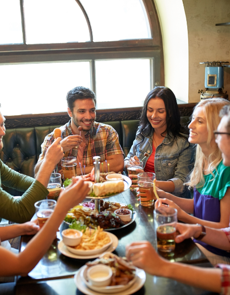How to choose the right CRM for your restaurant
Imagine all the customers who’ve visited your restaurant over the past year waiting at your door, sharing memories of fantastic service and the dishes they loved. They’re recommending your restaurant to friends and family, making it a must-visit in their social circles.
If you’re a restaurant manager, especially for a multi-site business, the opportunity to keep those customers coming back and spreading the word even further is invaluable. At Access Hospitality, we understand the challenges of balancing day-to-day operations with building lasting customer relationships. A reliable Customer Relationship Management (CRM) system is an essential tool in making this happen - integrating reservations, data collection, targeted marketing, and loyalty programs into a single, accessible view.
As one of the UK’s leading providers of hospitality software, we’ve guided restaurants of all sizes through the process of selecting the CRM that best supports their goals. In this article we’ll highlight key factors to consider when investing in a CRM - such as features, budget, and ROI - so you can make a well-informed decision. By the end, you’ll feel ready to choose the right system to build stronger customer connections and keep your business moving forward.
Here at Access Hospitality, we specialise in helping restaurants make the most of their customer data, and we help businesses of all sizes. We often see that even the most successful restaurants face challenges with customer segmentation, and even though they're already thriving, by turning the data into targeted campaigns that boost profits, customer segmentation can take things to the next level.
In this article, we'll show you what customer segmentation is, we'll dive into its benefits and cover different types of restaurant segments, so you can start implementing segmentation strategies right away.
What is CRM software?
Hospitality Customer Relationship Management (CRM) software is all about helping hospitality businesses build and maintain meaningful connections with their customers, both new and returning. At its core, CRM software is designed to keep all the details in one place, from customer contact information to preferences and past visits.
For example, from the moment a customer makes a reservation, a CRM can start building a profile with key details: name, contact information, social media profiles, and even special notes like whether it’s a birthday or anniversary booking. During and after their visit, a powerful CRM with strong integrations is able to collect even more useful data, such as menu choices, dietary needs, and feedback. With all this information in one place, it becomes easier to personalise future visits, run loyalty programs, and send relevant marketing messages that increase your chance of getting that customer to return.
CRM software essentially does the heavy lifting when it comes to tracking customer details, so you can focus on what matters most: creating memorable dining experiences that keep them coming back.
Why do restaurants need CRM software?
Unlike quick-stop food outlets, where customers often visit out of convenience, restaurants rely on building relationships to keep guests coming back. A CRM can make this much easier, especially for multi-site businesses that rely on customer loyalty and memorable experiences to keep growing.
With a CRM, you can get to know your customers’ preferences, track their visits, and reward their loyalty. Imagine having all your guest information, including reservation history, dietary needs, favourite dishes, and even birthdays, all at your fingertips. From there, you can offer personalised deals and invitations that make your customers feel valued and excited to return.
And CRM software doesn’t work in isolation; it integrates smoothly with your restaurant’s POS and reservation systems, keeping everything connected. The result? A more personalised experience for each guest, operational efficiency for your team, and data-driven insights that help you to grow your business.
Choosing the right restaurant CRM
Choosing the right CRM for your restaurant comes down to a few key factors, including the size of your business, your budget, and the ROI you hope to see. Let’s break down some of the essential features to look for and how they might fit your needs.
Consider the essentials
At a minimum, your CRM should support the core aspects of Customer Relationship Management:
-
Data integration: Connect all your customer data in one place, from reservation history to spending habits.
-
Customer segmentation: Group customers so you can make sure you’re getting the right message in front of the right people at the right time.
-
Engagement tools: Personalise communications with targeted marketing campaigns, loyalty offers, and seasonal updates.
-
Reporting & analytics: Access insights that help you understand what’s working and plan for the future.
Think about scalability and support
As your business grows, your CRM should be able to keep up. If you’re just getting started, a simpler system might work, but as you expand, features like multi-site management, custom reporting, and integrations with your EPoS and booking systems become more important. Vendor support is also key; look for a CRM with reliable customer support to help when you need it.
Set a realistic budget
CRMs usually require an upfront investment or monthly subscription. If you’re running a small, single-site restaurant, it may be worth starting with a lower-cost solution or managing marketing campaigns manually. But if you’re a multi-site operator with more complex needs, investing in a CRM with advanced capabilities could offer a solid return.
What are the benefits of using CRM in your restaurant?
We’ve already looked at the positive effects of CRM on customer loyalty and your restaurant’s bottom line, but let’s take a closer look at what it can do to support your day-to-day operations.
Better guest experience - Make it personal
A CRM gathers all those small details about your guests - their favourite dishes, dietary needs, important dates, and even local demographics - so you can tailor every visit. If your restaurant is popular with families, you might plan promotions or menu changes around school holidays. Or, if you’re expanding your plant-based options, a CRM can help you identify past guests who ordered vegan dishes, making it easy to reach out with personalised offers.
Put your database to work
So, you’ve got a database filled with contact details, menu choices and total spend but did you know that, statistically, on average 70% of those customers may only have visited your restaurant once? Make this data work for you and look closely at who they are. What time of year did they visit? Was it for a birthday? If so, put the memory of their last visit at the forefront of their minds and contact them with menu updates or a birthday discount to tempt them back and make a booking.
Spread the word
A customer has visited your restaurant, sipped a complimentary glass of fizz, tucked into some great food, relaxed, chatted, laughed, and felt thoroughly looked after. So, what happens next? They’ll probably talk about their visit to your restaurant with friends and family at some point, but what more can you do to make sure they’re telling everyone about what a wonderful experience they had with you?
A follow-up email serves two main purposes. Firstly, it makes your customer feel valued. Secondly, it’s an opportunity to encourage customers to leave a review, or book to come back. According to Access Hospitality’s Tech Shift report, 53% of consumers are likely to leave a review if prompted, and nearly a quarter would consider pre-booking their next visit with a simple follow-up. Keeping these communications targeted and timely helps you stay top-of-mind with customers.
Streamline staffing needs
A CRM can help you understand peak times, regular reservation patterns, and seasonal trends, which means you can better plan staffing schedules. By anticipating busy periods based on customer data, you can avoid being understaffed or overstaffed, making it easier to maintain service quality and control labour costs.
Optimise inventory management
By offering insights into popular menu items and customer ordering habits, a CRM can help you with inventory planning. Knowing which dishes are most popular helps you forecast ingredient needs more accurately, reducing waste and ensuring that high-demand items are always available.
Improve demand forecasting
A CRM’s customer data can reveal patterns in visit frequency, peak dining times, and even specific days when reservations spike. This insight helps you forecast demand more accurately, allowing you to prepare for busy periods, adjust staffing, and manage inventory with precision. Whether it’s a seasonal rush or a local event that boosts foot traffic, having this data allows you to plan proactively, ensuring a seamless experience for guests and efficient operations for your team.
Identify trends for menu innovation
With a CRM tracking customer preferences and popular orders, you can spot trends that might inspire menu updates. For instance, if you notice a growing preference for specific dietary options, like gluten-free or plant-based dishes, you can expand your offerings in those areas to meet demand. This data-driven approach to menu innovation keeps your restaurant fresh and responsive to changing tastes.
Enhance team training and performance
A CRM’s insights into customer feedback and service patterns can also help in identifying training needs. If feedback highlights areas for improvement, like speed of service or menu knowledge, you can tailor training programs to address them. This targeted approach helps your team continuously improve, ultimately leading to a better guest experience.
Get more from your CRM with Access Hospitality
In this article, we’ve looked at the key things to consider when you’re looking for a new CRM, and how the right CRM system can enhance your restaurant’s brand and marketing needs, as well as improving customer retention and efficiency.
If you’re managing a single-site business or are just starting out, a basic CRM might be the right fit for now. But if you’re managing a larger or multi-site operation, Access Hospitality has options designed specifically for restaurants.
Access Acteol CRM software is fully customisable and developed specifically for restaurant businesses. It can be scaled to suit your business needs to give you even greater functionality, but to make things easier still, we developed Acteol SE for restaurants with fewer than 15 sites. For businesses with 16 sites or more, Acteol Enterprise is a solution designed to offer estate-wide, fully integrated systems where wider functionality is needed.
If you're ready to move forward, you can download our hospitality CRM brochure or speak with our CRM and marketing automation team to discuss how a CRM system can benefit your restaurant and get pricing information for the Acteol solutions.
More about customer loyalty
Related resources to support you






